The first E85 Escape Hybrids are hitting the streets this week, as Ford Motor Company delivered three of 20 new vehicles Wednesday to the Department of Energy, the Renewable Fuels Association (RFA), and the Governors’ Ethanol Coalition.
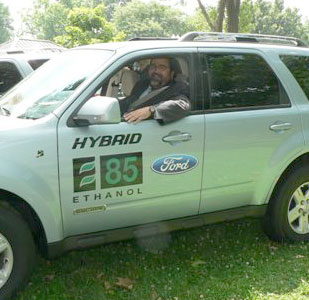 RFA president Bob Dinneen was all smiles as he climbed into the driver’s seat of the new vehicle which combines hybrid and flex-fuel vehicle (FFV) technology.
RFA president Bob Dinneen was all smiles as he climbed into the driver’s seat of the new vehicle which combines hybrid and flex-fuel vehicle (FFV) technology.
“The combination of hybrid and flex-fuel technology in one vehicle enables increased energy independence and reduced carbon emissions like no automobile before,” said Dinneen. “Ford has introduced a vehicle that runs primarily on ethanol created by our nation’s farmers, and then, with its hybrid power train, travels further on every gallon of that renewable fuel. This is an important achievement in the drive towards sustainable, secure energy.”
The experimental Escape features an electric motor that powers the vehicle at low speeds and a gasoline internal combustion capable of running on fuel blends up to 85 percent ethanol kicks in a higher speeds, according to Sue Cischke, Ford’s senior vice president, Sustainability, Environmental and Safety Engineering.
“Although we currently do not have plans to produce the Escape Hybrid E85, the research from this technology could lead to breakthroughs in even more advanced technologies,” said Cischke.
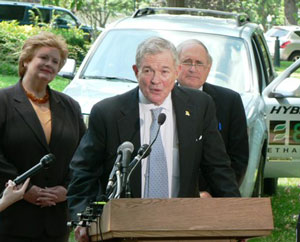 U.S. Senators Kit Bond (R-MO), Carl Levin (D-MI) and Debbie Stabenow (D-MI) joined Ford for a press conference on Capitol Hill to announce the new hybrid and talk about alternative fuels.
U.S. Senators Kit Bond (R-MO), Carl Levin (D-MI) and Debbie Stabenow (D-MI) joined Ford for a press conference on Capitol Hill to announce the new hybrid and talk about alternative fuels.
“Every gallon of biofuels grown in the Midwest means a gallon of oil we do not need to import from the dangerous Middle East,” said Bond. “We can and should do more to reduce pollution from vehicles. Ford today is showing its leadership in clean and efficient vehicles with a first-ever hybrid SUV that will also run on biofuels.”
(Read more on the Ford E85 Escape Hybrids from Ford, RFA and Senator Bond’s office. Thanks to Matt Hartwig of RFA for the photos.)




 “This legislation would set a floor for biodiesel demand, which will help ensure that the promising biodiesel industry continues delivering benefits to America,” said Joe Jobe, NBB CEO. “In addition to economic growth and pollution reduction, biodiesel delivers fuel refining capacity, something this nation desperately needs. Having a demand floor in place will help provide needed stability and reduce our dependence on foreign oil, which benefits all Americans.”
“This legislation would set a floor for biodiesel demand, which will help ensure that the promising biodiesel industry continues delivering benefits to America,” said Joe Jobe, NBB CEO. “In addition to economic growth and pollution reduction, biodiesel delivers fuel refining capacity, something this nation desperately needs. Having a demand floor in place will help provide needed stability and reduce our dependence on foreign oil, which benefits all Americans.” This Friday, officials with US BioEnergy including CEO Gordon Ommen, along with Minnesota Governor Tim Pawlenty, Fagen, Inc. CEO Ron Fagen, Minnesota Corn Growers Association Vice President Roger Moore, and local officials will celebrate the groundbreaking of a 100-million-gallon-a-year ethanol plant at Janesville, Minnesota. The ceremony starts at 11:00 a.m.
This Friday, officials with US BioEnergy including CEO Gordon Ommen, along with Minnesota Governor Tim Pawlenty, Fagen, Inc. CEO Ron Fagen, Minnesota Corn Growers Association Vice President Roger Moore, and local officials will celebrate the groundbreaking of a 100-million-gallon-a-year ethanol plant at Janesville, Minnesota. The ceremony starts at 11:00 a.m.
 U.S. Senators
U.S. Senators 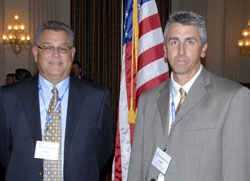 Here’s an interesting application for propane that targets the dairy industry from a company that’s known for making gas fired appliances.
Here’s an interesting application for propane that targets the dairy industry from a company that’s known for making gas fired appliances. We think of propane as a cooking or heating fuel but how about mowers?
We think of propane as a cooking or heating fuel but how about mowers?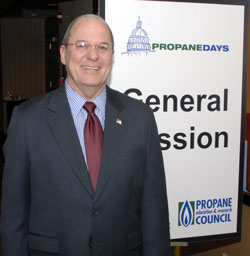 This morning I met with the President/CEO of the
This morning I met with the President/CEO of the  As I promo’d last week, I’m here in Washington, DC at Propane Days. The
As I promo’d last week, I’m here in Washington, DC at Propane Days. The  A Michigan utility has inked a 20-year deal to buy renewable energy from
A Michigan utility has inked a 20-year deal to buy renewable energy from 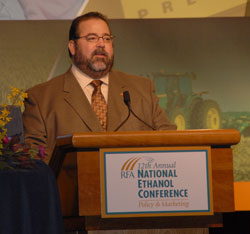 “Record-high gas prices, continued unrest in oil-producing regions of the world and the fragility of America’s oil refining complex underscore the necessity of developing renewable alternatives to fossil fuel,” said Renewable Fuels Association President Bob Dinneen.
“Record-high gas prices, continued unrest in oil-producing regions of the world and the fragility of America’s oil refining complex underscore the necessity of developing renewable alternatives to fossil fuel,” said Renewable Fuels Association President Bob Dinneen.